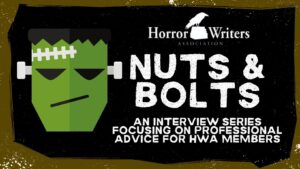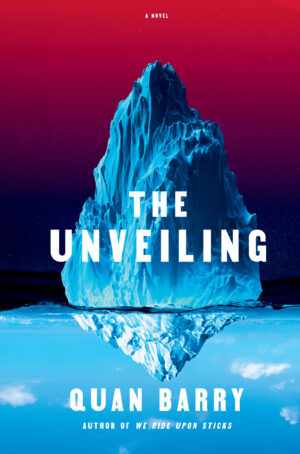 By Tom Joyce —
By Tom Joyce —
Quan Barry’s Black literary horror novel, “The Unveiling,” is set in a subgenre where a punishing landscape can drive the unwary to madness. According to Quan, that also serves as an apt description of the publishing business. The award-winning novelist, poet, playwright, and professor recently gave an interview for the HWA, where she talked about avoiding some of those hazards, discussed her writing technique, and shared career advice for younger and BIPOC writers.
 MAKING THE LANDSCAPE A CHARACTER
MAKING THE LANDSCAPE A CHARACTER
In “The Unveiling,” a group of stranded travelers psychologically unravel against an Antarctic landscape almost sentient in its cruelty, in a narrative that includes shout-outs to H.P. Lovecraft’s “At the Mountains of Madness” and Dan Simmons’s “The Terror.” But Quan said landscape can function as a character in any genre, as friend, foe, or Greek chorus.
She’s fine with doing her research via the internet. While first-hand experience of a place can certainly enhance a story, the story itself is paramount. “Right from the get-go, I’m thinking ‘how can the landscape add to the conflict?’” she said.
HER WRITING PROCESS
Quan sees similarities between writing and sculpting. The first step? Acquiring that block of stone. Most of the work involves chisels and polishers.
“I tell people I hate writing, but I love revising,” she said.
She recommends working out the story first, then doing research to supplement it. Be open to using something new based on what you learn. But if you start with a research dive and work out the story from there, you risk wasting time. Worse, you might be tempted to lard your story with information that you find interesting, but your readers won’t.
“You don’t want to get bogged down in it,” she said. “You don’t want to write a travelogue.”
WHAT SHE WISHED SHE KNEW WHEN STARTING
While “show, don’t tell” is popular in academic circles, writing is a matter of both showing AND telling. And of knowing when to do either.
When getting started, writers tend to err on the side of over-explaining. In particular, they tend to begin stories too early. The screen version of “The Wizard of Oz,” for example, could have begun with backstory explaining how Dorothy ended up living on the farm with her aunt and uncle. “Achieving that balance can be a struggle for emerging writers,” Quan said.
THE BUSINESS OF WRITING
“I’m not going to lie,” she said. “It’s a tough road.”
Don’t travel it alone if you don’t have to. Quan recommends finding a community, which Zoom has made much easier, particularly for genre writers. She also recommends taking workshops, whether online or in person at a local community college. And even if you walk away with ideas of what NOT to do, that’s still valuable.
“Even just a one-day or a weekend workshop can give you a lot of pointers,” Quan said.
To find an agent, look in the acknowledgements sections of books similar to yours, where authors usually mention their agents. Make your queries short and pithy. Mention people you’ve worked with and where you’ve been published. And expect to send out LOTS of queries.
“You want yours to be memorable in some shape or form,” she said.
ADVICE FOR YOUNGER AND BIPOC WRITERS
Don’t hesitate to confront the issues affecting your community. Don’t feel obliged to address them either. “My advice would be to write the stories you want to write, not to write the stories you think you’re supposed to write,” she said.
Find a community of other writers like you, in person or online. Don’t write to market, unless it’s a project you’re personally invested in. “A story needs to really interest you.”
Writing may supplement your main source of income, but likely won’t replace it. She relies on her income as an educator, and estimates that maybe three percent of published authors can live off their writing. “Most don’t get royalties,” she said. ““For most authors, it’s actually not a sustaining career.”
ON LITERARY VS. GENRE FICTION
“Literary horror” is no longer an oxymoron in the publishing world and never has been in real life, Quan said. Barriers are coming down in other genres as well, with the emergence of “literary rom-com,” and writers such as R.F. Kuang hitting the New York Times bestseller list by drawing readers of both fantasy and literary fiction.
Quan acknowledges that genre labels can be helpful for reaching a particular readership. Horror readers will seek out their genre of choice and be disappointed if they get something else. Still, she believes that writers – particular emerging writers – shouldn’t be too concerned about conforming to a particular genre.
“A lot of writers will say genre is really a marketing thing. I think there’s more hybridity happening now in the past 10 years. Authors who are supposed to be ‘literary authors’ are looking for genre.”
WHERE TO FOLLOW HER ONLINE
Quanbarry.com
 |
Quan BarryQuan Barry is the author of eight books of fiction and poetry including “When I’m Gone,” “Look for Me in the East,” “We Ride Upon Sticks,” winner of the 2020 ALA Alex Award; and “She Weeps Each Time You’re Born.” Her most recent poetry collection, “Auction,” was named one of the five best collections of 2023 by the New York Times. Her first play, “The Mytilenean Debate,” premiered in 2022. She is the Lorraine Hansberry Professor of English at the University of Wisconsin–Madison. More info at https://www.quanbarry.com/ |
Tom Joyce writes a monthly series called Nuts & Bolts for the Horror Writers Association’s blog, featuring interviews about the craft and business of writing. Please contact Tom at TomJHWA@gmail.com if you have suggestions for future interviews.


